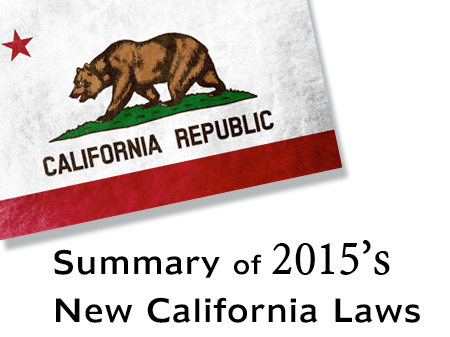
2015 brings an explosion of new laws benefitting employees and imposing new requirements on small businesses. This article provides a summary of the most important new laws. Please seek legal advice on how each law applies to your situation specifically.
Wage-Hour: Minimum Wages Are Increasing
The minimum wage requirement for several cities increases in 2015 and the state minimum wage also increases. The federal minimum wage has not increased in more than 5 years and is stuck at $7.25/hour. In 19 states, federal law still permits $2.19 an hour as the minimum wage for tipped employees. Yes, that’s correct: Two Dollars and Nineteen Cents per hour.
Wage-Hour: Employers Must Now Pay for At Least 3 Days Sick Leave
The new paid sick leave law goes into effect in July 2015 and covers essentially every small business in California. The new law’s requirements, including record keeping and notices for each pay check, require employers to acquire legal counsel to ensure compliance.
Wage-Hour: Required Written Notice to Each New Employee
Is Changing:
Most employers still fail to comply with Labor Code Sec. 2810.5 which mandates a written (not verbal) notice of wage rates, pay dates, and worker’s compensation insurance information. In 2015 employers must also supply a paid sick leave notice on the new written form.
Wage-Hour: Client Employers Have New Liability When Using
Specific Contractors:
The year 2013 saw new laws severely regulating client employers’ contracts with construction, farm labor, garment, janitorial, security guard, and warehouse contractors having their own workers. A new 2015 amendment makes client employers share the legal liability for wage and workers compensation failures when such contractors fail in their own legal obligations.
Wage-Hour: Liquidated Damages Are Equal to Unpaid Wages
When a minimum wage violation occurs, one new law makes clear such wage violations creating back pay, also create the full and equal amount of liquidated damages automatically being imposed on the employer, along with the unpaid wages.
Wage-Hour: Recovery from Heat Stress Is Paid Hours Worked
Most employers know rest breaks and working meal breaks must be compensated. A new Labor Code revision makes clear any mandated “recovery” period, required to prevent heat stress, is also compensable hours worked.
Wage-Hour: Public Works Employers Have New Exposure
New statutes broaden the definition of “public works” projects and enhance recovery of damages and liabilities against those companies employing workers on projects originally funded, at least in part, by public money.
Discrimination-Harassment: Undocumented Workers –
Drivers’ Licenses Must Be Accepted
The Fair Employment & Housing Act has been amended to prohibit discrimination against workers offering one of the new undocumented worker drivers’ licenses now available by the Dept. of Motor Vehicles.
Discrimination-Harassment: Anti-Bullying Training Is Now Required
Employers with at least 50 employees must already provide sexual harassment management training every two years, and beginning in 2015, that training must include training on abusive conduct, aka “bullying.” Bullying has been broadly defined by our legislature, to include such actions as derogatory remarks, insults, epithets, and undermining of work performance.
Privacy: Personal Computerized Information Has More Protection
California’s prior law protecting customer information has been updated to include new notice requirements to the customer when a data breach has occurred, payment for identity theft protection and other new requirements to protect such data.
Occupational Safety: Employers May Now Use Email to Report
Serious Injuries
Labor Code Sec. 6409.1 has been amended so employers aware of serious injuries, illness or death related to their businesses, may now report by telephone or email (instead of Telegraph).
Jury Trial Right: Arbitration is Banned for Certain Violence Related Claims
Two little-known statutes prohibiting violence against California workers have been amended, so persons who allege either violence or threats of violence cannot be forced into the secret arbitration process with their claims. The legality of this new law is still an open question.
Jury Trial Right: Arbitration Companies Must Post Understandable Data
After 10 years of avoiding compliance with California’s former law requiring disclosures by those organizations engaged in secret arbitrations (operating in place of judge and jury, outside the view of the public), the legislature determined 100% of such organizations have avoided full compliance with California’s disclosure laws. New reporting and disclosure requirements have been mandated to hopefully shed fuller light on this court-denial process.
Unemployment Insurance: New Certifying Persons Exist
Beginning in 2017, physicians’ assistants, under certain circumstances, may certify a worker’s disability status, so the worker can receive unemployment insurance claims through the EDD.
Unemployment Insurance: Appeals Time Limits Are Extended
Beginning in July 2015, the time for both employees and employer, to appeal an initial decision of the EDD, is extended to 30 days from the prior 20 days limit. The time for appealing a decision from an Unemployment Insurance Appeals Board Administrative Judge also becomes 30 days.